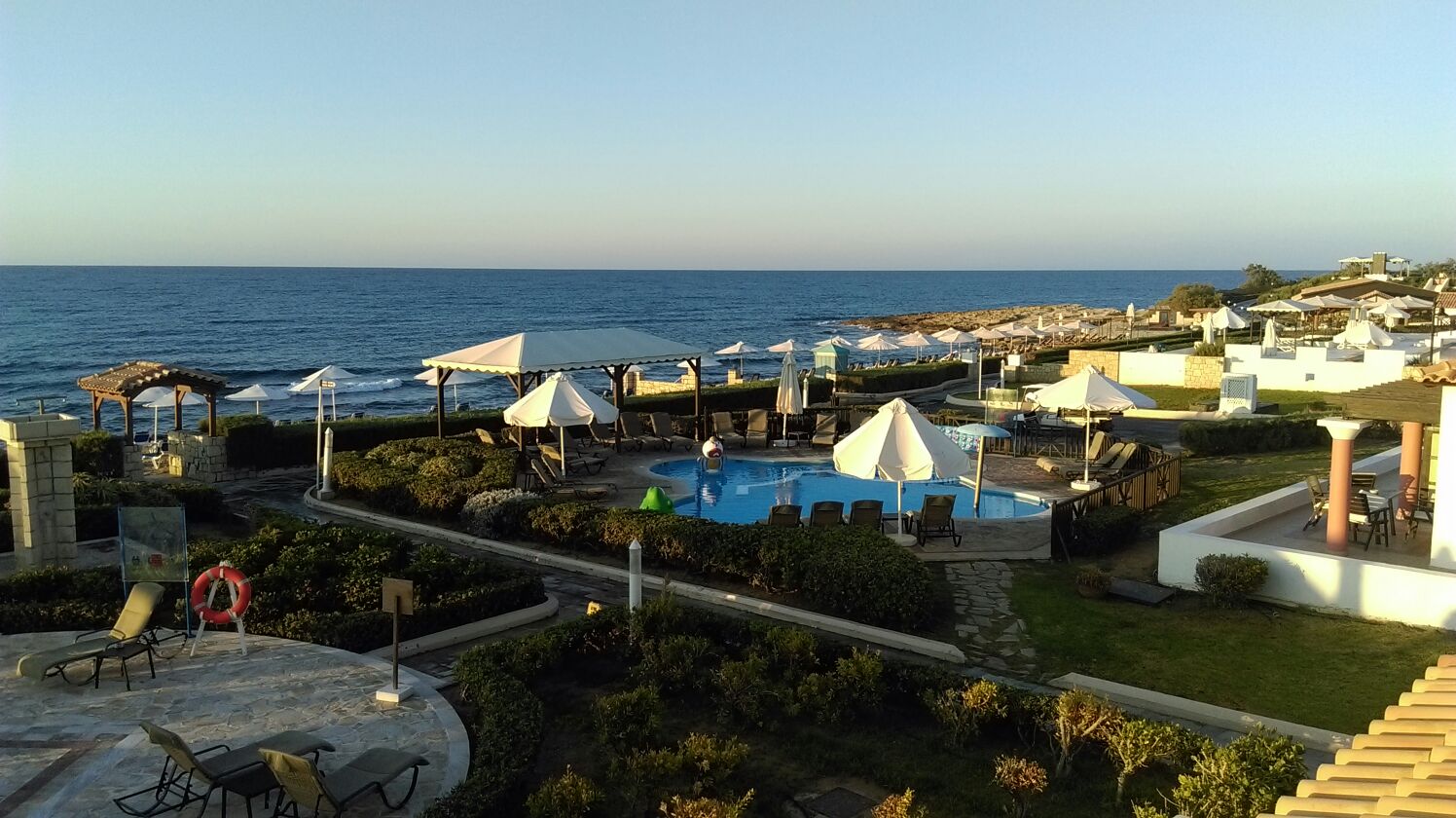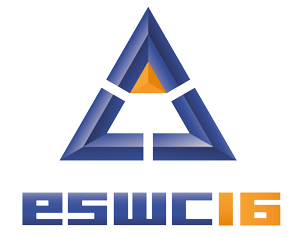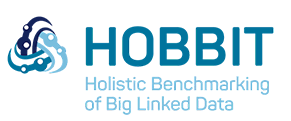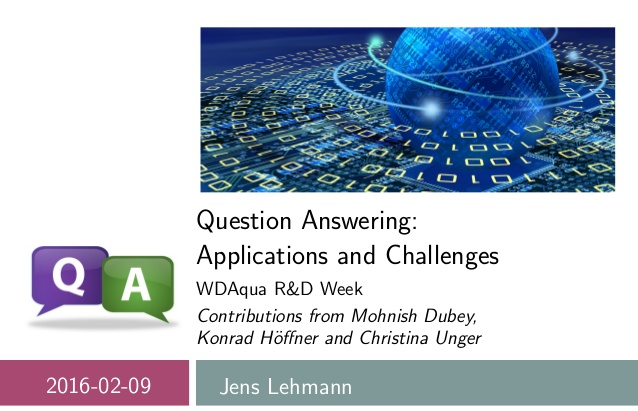SLIPO project kick-off & HOBBIT project meeting
SLIPO, a new project within the EU’s “Horizon 2020” framework program, kicked-off in Athens, Greece on 18th and 20th of January 2017.
The main goal of SLIPO is to transfer the research output generated in our previous project GeoKnow to the specific challenges of POI data. In SLIPO we introduce validated and cost-effective innovations across the POI value chain. Beyond that, we are aiming to improve the scalability of our key research frameworks, such as LinkedGeoData, DL-Learner or LIMES.
Our partners in this project are:
- Athena RC (Coordinator)
- Institut für Angewandte Informatik e. V.
- Fraunhofer IAIS
- TomTom Development Germany GmbH
- WIGEO-GIS Softwareerstellungs-und Handelsgesellschaft MGH
- Geospatial Enabling Technologies Ltd (GET)
Find out more at http://sda.tech/projects/slipo/.
This project has received funding from the European Union’s H2020 research and innovation action program under grant agreement number 688227.
Afterward, on 1st and 2nd February on Athens, Grece the HOBBIT project successfully held its 3rd plenary meeting at NCSR_Demokritos premises.
Every one of the project’s work packages presented their recent progress and important discussion was held on the upcoming release of the first version of the platform. Furthermore, the project is quickly approaching the realization of its accompanying challenges at the ESWC and DEBS conference, for which technical and organizational agreements were made.
More information on the upcoming challenges can be found under https://project-hobbit.eu/challenges .
Paper accepted at AAAI 2017
![]()
We are very pleased to announce that one paper from our group got accepted for presentation at the Thirty-First AAAI Conference on Artificial Intelligence (AAAI-17), which will be held on February 4–9 at the Hilton San Francisco, San Francisco, California, USA.
Radon– Rapid Discovery of Topological Relations Mohamed Ahmed Sherif, Kevin Dreßler, Panayiotis Smeros, and Axel-Cyrille Ngonga Ngomo
Abstract. Datasets containing geo-spatial resources are increasingly being represented according to the Linked Data principles. Several time-efficient approaches for discovering links between RDF resources have been developed over the last years. However, the time-efficient discovery of topological relations between geospatial resources has been paid little attention to. We address this research gap by presenting Radon, a novel approach for the rapid computation of topological relations between geo-spatial resources. Our approach uses a sparse tiling index in combination with minimum bounding boxes to reduce the computation time of topological relations. Our evaluation of Radon’s runtime on 45 datasets and in more than 800 experiments shows that it outperforms the state of the art by up to 3 orders of magnitude while maintaining an F-measure of 100%. Moreover, our experiments suggest that Radon scales up well when implemented in parallel.
Acknowledgments
This work is implemented in the link discovery framework LIMES and has been supported by the European Union’s H2020 research and innovation action HOBBIT (GA no. 688227) as well as the BMWI Project GEISER (project no. 01MD16014E).
SANSA 0.1 (Semantic Analytics Stack) Released
Dear all,
The Smart Data Analytics group is very happy to announce SANSA 0.1 – the initial release of the Scalable Semantic Analytics Stack. SANSA combines distributed computing and semantic technologies in order to allow powerful machine learning, inference and querying capabilities for large knowledge graphs.
Website: http://sansa-stack.net
GitHub: https://github.com/SANSA-Stack
Download: http://sansa-stack.net/downloads-usage/
ChangeLog: https://github.com/SANSA-Stack/SANSA-Stack/releases
You can find the FAQ and usage examples at http://sansa-stack.net/faq/.
The following features are currently supported by SANSA:
- Support for reading and writing RDF files in N-Triples format
- Support for reading OWL files in various standard formats
- Querying and partitioning based on Sparqlify
- Support for RDFS/RDFS Simple/OWL-Horst forward chaining inference
- Initial RDF graph clustering support
- Initial support for rule mining from RDF graphs
We want to thank everyone who helped to create this release, in particular, the projects Big Data Europe, HOBBIT and SAKE.
Kind regards,
DL-Learner 1.3 (Supervised Structured Machine Learning Framework) Released
Dear all,
the Smart Data Analytics group is happy to announce DL-Learner 1.3.
DL-Learner is a framework containing algorithms for supervised machine learning in RDF and OWL. DL-Learner can use various RDF and OWL serialization formats as well as SPARQL endpoints as input, can connect to most popular OWL reasoners and is easily and flexibly configurable. It extends concepts of Inductive Logic Programming and Relational Learning to the Semantic Web in order to allow powerful data analysis.
Website: http://dl-learner.org
GitHub page: https://github.com/AKSW/DL-Learner
Download: https://github.com/AKSW/DL-Learner/releases
ChangeLog: http://dl-learner.org/development/changelog/
DL-Learner is used for data analysis tasks within other tools such as ORE and RDFUnit. Technically, it uses refinement operator based, pattern-based and evolutionary techniques for learning on structured data. For a practical example, see http://dl-learner.org/community/carcinogenesis/. It also offers a plugin for Protégé, which can give suggestions for axioms to add.
In the current release, we added a large number of new algorithms and features. For instance, DL-Learner supports terminological decision tree learning, it integrates the LEAP and EDGE systems as well as the BUNDLE probabilistic OWL reasoner. We migrated the system to Java 8, Jena 3, OWL API 4.2 and Spring 4.3. We want to point to some related efforts here:
- A new DL-Learner overview article is available at the Journal of Web Semantics (pre-print PDF).
- We started a benchmarking framework for supervised machine learning from structured data (not restricted to RDF/OWL).
- An article about the SPARQL reasoning component is now available (published at ECAI).
- An article about terminological decision tree learning is available (published at EKAW).
We want to thank everyone who helped to create this release, in particular we want to thank Giuseppe Cota who visited the core developer team and significantly improved DL-Learner. We also acknowledge support by the recently SAKE project, in which DL-Learner will be applied to event analysis in manufacturing use cases, as well as Big Data Europe and HOBBIT projects.
Kind regards,
Lorenz Bühmann, Jens Lehmann, Patrick Westphal and Simon Bin
SDA@ESWC16

ESWC Extended Semantic Web Conference 2016 is one of the major venue for discussing the latest scientific results and technologies around semantic technologies. Our members have actively participated in 13th ESWC 2016, which took place in Crete, Greece from May 29th to June 2nd.
We are very pleased to report that:
Two papers from our group were accepted for presentation as full research papers @ESWC16
- AskNow: A Framework for Natural Language Query Formalization in SPARQL by Mohnish Dubey, Sourish Dasgupta, Ankit Sharma, Konrad Höffner, Jens Lehmann.
Mohnish Dubey presented his work on Natural Language Query Formalization in SPARQL based on AskNow Project in the main conference. The audience showed high interest in his presentation and appreciated the natural language understanding provided by the AskNow system. Following discussion included further challenges in QA system and constructive suggestions for possible improvement.@MohnishDubey presented #AskNow“A Framework for Natural Language Query Formalization in SPARQL”at #eswc2016 #QuestionAnswering #SemanticWeb
— SDA Research (@SDA_Research) June 2, 2016
- Semantically Enhanced Quality Assurance in the JURION Business Use Case by Dimitris Kontokostas, Christian Mader, Christian Dirschl, Katja Eck, Michael Leuthold, Jens Lehmann, Sebastian Hellmann
A Workshop paper
- DBtrends : Publishing and Benchmarking RDF Ranking Functions by Edgard Marx, Amrapali J. Zaveri, Mofeed Mohammed, Sandro Rautenberg, Jens Lehmann, Axel-Cyrille Ngonga Ngomo and Gong Cheng, SumPre2016 Workshop at ESWC 2016
The workshop Know@LOD was held by Prof. Heiko Paulheim and Prof. Dr. Jens Lehmann. It featured lively discussions on combinations of the Semantic Web and machine learning.
The 5th edition of the Know@LOD workshop starting at @eswc_conf today at 9am with nine presentations! #machinelearning #semanticweb
— Jens Lehmann (@JLehmann82) May 30, 2016
Prof. Jens Lehmann took part in the two day HOBBIT project plenary which started the last day of the ESWC conference. HOBBIT deals with Big Linked Data benchmarks and at the meeting 8 different datasets were discussed along with the HOBBIT benchmarking platform and HOBBIT association. SDA will specifically focus on question answering and faceted browsing benchmarks inside of the project. Already during ESWC, there was a dedicated HOBBIT event in which requirements for benchmarks and the platform were discussed.
Prof @JLehmann82 gave his insight on benchmarking – “Visualization & Services” for @hobbit_project #eswc2016
— SDA Research (@SDA_Research) June 1, 2016
ESWC16 was a great venue to meet the community, create new connections, talk about current research challenges, share ideas and settle new collaborations. We look forward to the next ESWC conference.
BDE technical workshop in Athens
The fourth BDE Technical workshop was hosted by NCSR-D in the beautiful and historical city of Athens. The representatives from technical partners enthusiastically attended the workshop.
The purpose of these workshops is to review the emerging technologies, select the ones that best suit the project objectives and determine the upcoming project goals and milestones. For a recap, in the first workshop, we determined the desired features of the BDE platform. In the second workshop we selected the particular technologies from a wide range of Big Data zoo, that would help in achieving the desired features. We reviewed our progress, addressed the challenges and prepared a road map for the future in the third workshop.
CSCUBS-16
 CSCUBS is organized by PhD- and MSc-Students and aims to promote research in computer science and scientific exchange among students. The participation of researchers and practitioners of the field is also encouraged.
CSCUBS is organized by PhD- and MSc-Students and aims to promote research in computer science and scientific exchange among students. The participation of researchers and practitioners of the field is also encouraged.
Papers accepted at ESWC 2016

One paper from our group got accepted for presentations at the 13th Extended Semantic Web Conference (ESWC 2016), held in Heraklion, Crete, Grece. The ESWC is a important international forum for the Semantic Web / Linked Data Community.
AskNow: A Framework for Natural Language Query Formalization in SPARQL Mohnish Dubey, Sourish Dasgupta, Ankit Sharma, Konrad Höffner and Jens Lehmann
For more information on the conference program and other papers please see here.
Question Answering Challenges & Applications
Job Offering in the Area of Semantic Web
The research group Smart Data Analytic (SDA) at the Institute for Applied Computer Science at University of Bonn and Fraunhofer Institute for Intelligent Analysis and Information Systems (IAIS) opens positions for 1. Akademischer Rat (comparable to Assistant Professor), 2. PostDoc and 3. PhD Student.



